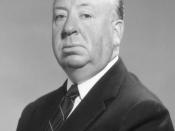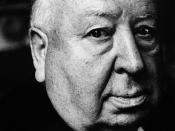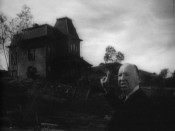Alfred Hitchcock, Director
Alfred was the third and youngest child in the family. He might have gone on to follow in his father's footsteps as a grocer or develop a career of less notoriety except, perhaps, for a chilling incident in his early youth. Alfred was just five years old the day he committed some misdeed that convinced his father he needed a lesson in discipline. His father sent him down to see the chief of police, with a note about what should be done to teach Alfred the error of this ways. The police chief promptly put him into a cell and slammed the door shut. Later, Alfred recalled that "the sound and solidity of that closing cell door and the bolt" never left his memory. He was really only abandoned behind bars for five minutes. Upon his release, the officer made sure to impress him with the chilling words "that's what we do to naughty boys".
(Shepler, August 15, 1999)
Alfred's fear of authority and punishment was reinforced during his years at the Jesuit school, St. Ignatius College. At that time, corporal punishment was meted out by ritual beatings on the hands with a hard rubber strap. Alfred Hitchcock would later recall that those incidents felt to him much like "going to the gallows." Punishment, and terror of it being unfairly administered by the police to someone undeserving would later emerge in Hitchcock's movies, particularly "The Thirty-Nine Steps", "I confess", "The Wrong Man" and "North by Northwest".
Every director makes the choices of what to emphasize and what to play down in a given screenplay. Hitchcock, throughout his career, always chose to highlight irony, surprises, moral ambiguity, and the uncertainties of life. I will attempt to illustrate what I think are Hitchcock's best attributes and supreme techniques...


